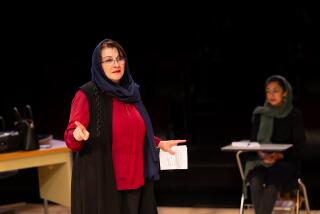But how will it translate?
Three years ago I was sitting in a room in New York with some actors, a director and a young Iraqi woman named Wassan who was going over an early draft of my play “Bengal Tiger at the Baghdad Zoo” and helping the actors with the Arabic that is peppered throughout the script. Wassan went through the lines I had written out in English and translated them, and then helped the actors with the pronunciations and the phonetic spellings so they could go home and practice speaking in a different language. Wassan, a curator of Islamic art and architecture at the Brooklyn Museum, was volunteering her time and work to help me. She was born in Iraq, and I was moved and honored that she felt the play merited her attention.
The experience of working with Wassan, and with the other translators who have since helped me with the play, has been uniquely interesting to me, as the act of translation is at the core of “Bengal Tiger.” One of the central characters in the play is an Iraqi man working as a translator for the U.S. military, and there are several scenes in the play in which a person stands between two others and tries -- sometimes in vain -- to allow for communication and understanding. No subtitles are used during those scenes because it’s important to me that the audience sense the confusion and frustration of being unable to communicate while a situation becomes dire.
The play itself is an act of translation, in that I have never been to Iraq, I have never fought in a war and, obviously, I have never been dead or a ghost or a tiger or wandered through limbo. The play engages with all these things, and so I’m basically guessing my way through the territory, hoping it all coheres. The idea for the play came to me through a small AP article about the killing of a Bengal Tiger at the zoo in Baghdad at the start of the war. That surreal event has since, through many drafts, mutated into a play. Writing, it seems to me, can translate the unknown into the known, the mysterious into the lucid, the abstract into the concrete. And even if it doesn’t, a writer can try. Sometimes, however, if I’m tired, lazy, or if my brain is just too filled up with other things, I don’t try hard enough. I’d like to give you an example.
About a week after Wassan helped us through the Arabic in the script, she agreed to participate in a post-show panel discussion at the Lark Play Development Center. Besides Wassan and myself, there was a State Department official who was a former U.S. liaison to the Iraqi Parliament, and there was a journalist -- the only American reporter to smuggle himself into northern Iraq via the Syrian border. Between Wassan and these two guys, I had little to say, and was simply impressed that these people had agreed to come to my play.
The audience asked a lot of questions. Near the end, one man asked a question that was both provocative and, seemingly, totally reasonable. He asked the panel, “Does Iraq still exist?”
The State Department guy went first and came to the conclusion that no, as we have understood that country, Iraq no longer exists. The journalist had his take and also concluded that Iraq had ceased to exist. The question and the responses made sense to everyone, because to all of us, Iraq was an abstraction. It was an idea. It was something we thought about, philosophized about, debated about, and it was a country that, apparently, could disappear in a flash.
The audience was satisfied, and the evening ended without Wassan or me responding at all. Because the question seemed so natural, and the answers so eloquent, I had not considered what it all may have meant to Wassan. She was horrified. Horrified at the question, at the responses, and at the very notion of sitting in a room with a group of Americans who could casually state that her country of birth, where many members of her family still lived, had ceased to exist.
She left without saying much, and even as she did, I did not totally understand the weight of her anger. But I do now, and three years later I think about that night often.
I wish I had had the wherewithal to understand how offensive the question and the answers may have been to her. I wish I had said something to the audience, or had said something to her. But I didn’t, because my mind wasn’t quick enough, and abstractions are difficult to cast aside.
Iraq exists. It’s the cradle of civilization, it’s where writing was invented, it’s where algebra was invented, it’s where they invented the wheel. And it’s a country that on March 20, 2003, was invaded by the United States although it posed no immediate threat to our national security.
I think as a playwright I’m trying to translate abstractions into some sort of emotional truth. It’s only an attempt, but I think there’s value in the attempt, and it begins with me, the playwright, and then extends to the director and the actors . . . and finally to the audience. Maybe it works, maybe it doesn’t, but it’s helpful, to me at least, to remember that everything I think I know is subject to translation.
More to Read
The biggest entertainment stories
Get our big stories about Hollywood, film, television, music, arts, culture and more right in your inbox as soon as they publish.
You may occasionally receive promotional content from the Los Angeles Times.





